- Home
- Jane Peart
The Pledge, Value Page 2
The Pledge, Value Read online
Page 2
It was a family joke how the letters arriving from Philadelphia came at a rate that caused Aunt Cady to raise inquisitive eyebrows when the post was delivered and JoBeth came running down the hall.
“Did he say when he’d come by, Uncle Madison?” JoBeth tried to keep her tone light.
“Well, no, honey, now that you ask,” Uncle Madison said solemnly. “I didn’t inquire, either. I thought it might not be in keeping with how young ladies like to keep young gentlemen guessing. Maybe you might be entertaining some other young beau this afternoon. So I just told him he was always welcome to come visit.” Uncle Madison’s tone was level, but his eyes were twinkling with merriment.
“Oh, Uncle, you are a tease!”
JoBeth always tolerated Uncle Madison’s teasing. He enjoyed doing it and she didn’t mind. But if Wes was coming by this afternoon, she wanted to change into her new dress.
“What does Wes plan to do, Madison?” Aunt Josie asked him.
“Well, a few months ago his uncle told me he planned to ask Wesley to read law in his office with him. But I reckon that’s all changed now. Wes’ll probably join up with the same regiment as his cousins.”
The conversation went on past the subject of Wes’s return to Hillsboro. At least for the others. JoBeth, distracted by her own excitement at the prospect of seeing Wes again, was filled with nervous anticipation. How would it be after all these months? Half a year with nothing but letters? Had she said too much? Or too little? Did he still care about her? Or had he changed?
After the meal was over, Uncle Madison went back to his office, Aunt Josie for her nap, and JoBeth’s mother to her quilting frame. JoBeth hurried upstairs to her bedroom. From the armoire, she took out the dress she had saved to wear for Wes’s homecoming. It was a pale pink French lawn, sprigged with tiny blue flowers, its waist sashed in blue moire, its flounced skirt made to billow out over the three starched petticoats she would wear underneath.
Dressed, she sat down in front of her mirror and tried a half dozen hairstyles. Not an easy task, for JoBeth’s hair was naturally curly, thick, and inclined to be stubborn. Finally, flinging down her brush in exasperation, she impatiently tied her shoulder-length curls back and secured them with a blue satin ribbon at the nape of her neck.
Then she settled herself at the window, where she had a good view of the street, of the corner at its end, where, coming from the Spencers’ house, Wes could be seen walking toward the Cadys’. As she waited, she was filled with uncertainty. What did Wes think about the secession of the states, including North Carolina? The firing on Fort Sumter and its aftermath had happened while he was at college in Pennsylvania.
JoBeth was more knowledgeable about current events than some of the other young women her age in Hillsboro. One of JoBeth’s chores was to tidy and dust the parlor and Uncle Madison’s study. Although newspapers were not considered proper reading material for young ladies, JoBeth had a curious mind. As more and more reports of the raging debate between the states made bold headlines, JoBeth found herself picking up the daily papers her uncle discarded and reading the fiery editorials. It had all sounded ominous. Now the war was a reality.
Holly Grove, the spacious house at the end of a lane of holly trees, had once been her mother’s childhood home. There the Cadys’ son Harvel now lived, and there the latest events had been discussed at length for months. At first the sentiment was mainly for states’ rights, although most present were opposed to secession.
Every time the family gathered, their lively dinner-table talk often became a heated discussion of the crisis hovering over the country. JoBeth had heard all the points her relatives argued, and knew they were not Wes’s convictions. So when Uncle Madison suggested what Wes would probably do, JoBeth knew he was wrong. No matter what the Spencer twins did. Wes was still as different from his cousins as night and day.
JoBeth had been around the three enough to know that whenever the cousins had a difference of opinion, Wes was always able to diplomatically, logically, and sensibly settle it. However, this time she was not sure he would prevail. War fever was burning rampantly throughout the South, and the usually conservative state of North Carolina had caught it as well.
JoBeth remembered a conversation Wes and her uncle had had when Wes was here during the Christmas holidays. Wes had come to escort her to the McKennas’ party, and since she had not been quite ready, Uncle Madison took him into the parlor to wait for her. She was just coming downstairs when she heard their voices. To her surprise, their tone of voice was not casual or jovial but tense. Halfway down, she stopped to hear what they were talking about.
She heard Wes say, “I’m sorry, sir, but I was taught that slavery is wrong. To go to war over something like that—well, I just can’t agree that it’s the right thing to do.”
“It’s not so much slavery that’s the point here, Wes. How many people do we know personally who own any?”
Listening outside the door, JoBeth thought of Annie. Annie had already seemed old to her when JoBeth came to live here. Now the mahogany face was webbed with wrinkles, and her movements slow. But Annie still ruled the kitchen, and it seemed to JoBeth that both her mother and aunt were a little in awe of the venerable cook. A slave? She had never thought of Annie as a slave.
She strained to hear what else Uncle Madison was expounding upon.
“No, that’s just the flag those Northerners are waving! They want to dominate us, because they outnumber us in the Congress! What it is, is a matter of principle. States’ rights, my boy.”
“But states’ rights over the Union, sir? That doesn’t seem right. Both my great-grandfathers fought the British to form the Union. I was brought up to believe that to be loyal to that is every citizen’s duty….”
“Well, Wesley, I reckon you got filled with a lot of Northern thinkin’ up at that Pennsylvania college. Folks up north think and feel differently about things than we do. All I can say is, you’re going to bring a heap of trouble down on yourself and your family if it comes to war.” There followed a long silence that, to JoBeth, seemed to stretch endlessly.
“I hope it won’t come to that, sir.”
“You might rightly hope so, Wesley.” Uncle Madison’s voice had been solemn. Had it also been threatening?
“Yes, sir, I do.” Wes’s voice sounded strong.
Outside in the hall, JoBeth let out a long breath and hurried into the parlor. At her entrance, both men stood up.
“Well, now, lookahere!” Uncle Madison had exclaimed. “If this isn’t the prettiest young lady I’ve seen in a month of Sundays. I’d say she was well worth the wait, wouldn’t you, Wes?” He beamed at his niece, thinking what an attractive, graceful young lady JoBeth had become from the gypsyish tomboy she had been.
It was in that aura of pleasantness that they had gone happily off to a wonderful evening.
However, JoBeth hadn’t forgotten that overheard conversation. So much had happened since. What they had all dreaded had happened. They were at war with the North. What was Wes thinking now?
She didn’t have a chance to guess at the answer to her own question, because she saw Wes rounding the corner. JoBeth jumped up and ran down the steps to the front door before the doorbell might wake Aunt Josie or rouse Annie, who was probably nodding in her ladder-back rocker on the sunny back porch.
As he came up the steps, JoBeth caught her breath. He looked different somehow—taller, broader through the shoulders, handsomer. In spite of all the letters they’d exchanged, the things they’d written, she felt suddenly shy.
“Wes!”
“JoBeth!”
He stood there looking at her through the screen door. Then she opened it and stepped out onto the porch. “It’s so good to see you,” she said, holding out both hands.
He took them and held them tightly. “It’s been so long. I can’t believe I’m really here and seeing you,” he blurted out, then blushed. JoBeth was pleased. His words seem to evaporate that first awkwardness.
> One of the things she loved most about Wesley. He was so open, so without guile or pretense. He said what he thought, spoke what he felt.
“Would you like to sit down?” She gestured to the white wicker furniture on the porch. “I can have Annie bring us some iced tea or lemonade?”
“I’d really rather take a walk—to our favorite place, JoBeth. Past the churchyard, down by the creek that runs under the old stone bridge. I have so much to talk to you about, and”—he hesitated—“all the way down on the train, I kept remembering how we used to go there and talk.”
“Then, wait till I get my bonnet and parasol and run upstairs to tell Mama I’m going,” she said and went inside. Lifting her skirts and crinolines, she skimmed up the stairway and down the hall, then tapped on her mother’s sewing room door.
Johanna Shelby Davison was known for her beautiful quilts, her original designs. Mountain Star and Carolina Lily were two of her most popular patterns. When she had returned as a widow to Hillsboro to live with the Cadys, Aunt Josie had fixed up a small room—once a dressing room adjoining one of the large bedrooms upstairs—for her. Here a permanent quilting frame was set up for Johanna’s use. Soon she had a thriving business, which enabled her to send JoBeth to a good female academy, and Shelby to a fine boy’s boarding school.
Some of JoBeth’s earliest memories were of her mother bent over her quilting frame, her face rapt with concentration, her hand moving gracefully as she plied the needle in and out in a smooth, gliding motion.
JoBeth opened the door put her head inside. Her mother looked up questioningly.
Johanna Davison retained a youthful beauty—only tiny lines around her wide blue eyes and tender, vulnerable mouth traced the passage of years. She could have remarried. Upon her return to Hillsboro, several men had been eager to court the lovely young widow. But Ross Davison had been the love 23 of Johanna’s life. No one could ever replace him. Her life had centered on her two children. At the sight of her daughter, a smile softened her expression.
“What is it, dear?”
“Wes is here, Mama, and he wants to go for a walk.”
“That’s fine, dear. Go along then. Be sure to tell him hello for me and that Aunt Josie wants him to stay for supper.”
“Yes, Mama, I shall.” JoBeth turned and hurried back down to the porch, where Wes was waiting.
Opening her ruffled parasol, she took his arm and they went down the steps, out the gate. They both knew the way to the path that led past the church where both their families worshiped and up the hill to the arching stone bridge. Below flowed the broad stream where JoBeth had soaked her blistered foot the first day they had become friends.
The fact that Wes was here seemed like a dream to her. After all the months of writing to each other and waiting, to actually be together at last made JoBeth euphoric.
For the first few minutes, they talked about mutual friends. But the more news JoBeth told him about their acquaintances, the quieter Wes became. Gradually she sensed his thoughtful demeanor and stopped. She felt a little twinge of uneasiness. She and Wes had never had any trouble finding things to talk about before. In fact, one of the things she loved about their relationship was that they never ran out of things to say to each other. They delighted in each other’s company, preferring it to the many social events they were invited to. That’s why the sudden silence that fell between them frightened her. Was something wrong? Maybe Wes’s feelings for her had changed and he didn’t know how to tell her.
On the bridge, they paused for a few minutes, looking down to where the clear water rushed over the rocks. Then Wes turned gave her a long, searching look, smiled and said, “You’re so much prettier than I remembered.”
JoBeth felt her cheeks warm. She had hoped he would mention how becoming her dress was or how her blue bonnet ribbons matched her eyes, but this was much better. His words made her happy, but she wished he looked happier.
“You look troubled, Wes,” she said rather uncertainly. “Is anything wrong? What did you want to talk about?”
“I’m sorry, JoBeth. I don’t mean to worry you. I didn’t mean to bring it up—at least, not right away. Not on my first day home.”
“You look awfully serious.”
“I guess I do. I guess—well, it is serious.”
She pretended a pout. “Not about the war, I hope. That’s all we seem to hear nowadays.” She tilted her head and looked up at him quizzically. “What is it? You might as well tell me and get it over with. Then maybe we can enjoy the rest of the day!”
“I always could talk to you, JoBeth. The trouble is, I have to decide something. Uncle Wayne has asked me to come into his law firm to read law there—”
“Oh, Wes, how wonderful!” Impulsively she reached out, put her hand on his arm. “Then you’ll be staying in Hillsboro. People said you might go back to Philadelphia, since your grandmother is there and you went to college there. Now everything you wanted, worked for, has come true, hasn’t it?”
“Yes, everything has come true—except that everything else has changed.”
“What do you mean?”
“The war, JoBeth,” he said sadly. “Our country is at war.”
“I know that. But people say—at least everyone here says—that it won’t last … that it will all be over in a few skirmishes, maybe … then the politicians will settle things.” She broke off impatiently. “Oh, Wes, do we have to talk about this now? You’ve just come back! And I’m so happy. Please don’t spoil it with all this gloomy talk.”
“I’m sorry. All right, I’ll stop for now. But I can’t avoid really thinking about what I am to do.” He leaned toward her and took one of her hands. “Eventually you and I must talk about it. Because it affects us.”
“The war? Us?”
“Yes, JoBeth. Sooner or later everyone’s going to be affected. You, me.” He hesitated, then said, “It’s because I love you, JoBeth.”
Wide-eyed, JoBeth gazed at him.
“I mean, really love you. I hoped you’d come to know that through my letters. I guess I’ve loved you for a long time. Last Christmas I knew it. I just felt I couldn’t say anything until I had finished my education. I had to have a way to support a wife before I could ask you to marry me. Now all that’s changed.”
She took a deep breath and said, “I love you, too. So how has it changed, Wes?”
“Oh, JoBeth, don’t you see?”
“No.”
Wes shook his head, and his mouth tightened into a firm line. “This war, it’s changed everything. I know how everybody in Hillsboro feels. Your relatives and mine. It’s not that simple. In fact, it’s very complicated.”
She frowned, looking puzzled. “Why is it?”
“Because I guess you could say I’m not simple.” He sighed. “Uncle Wayne wants an answer. Either I stay and go into law practice with him or I join up. Blakely and Will are all het up, ready to go.”
“Well, you’ve never played ‘follow the leader’ with them!” she declared. “So what does what they do have to do with us? Oh, Wes, can’t we just be happy?” JoBeth asked, knowing it was a silly thing to say, but she couldn’t help it. Wes had just told her what she’d been longing to hear, and now he was ruining it by bringing up the war and all the things she’d rather forget.
“Because people have to choose. And it’s splitting our country in two. Splitting families. That’s what I’m facing. That’s what I had to talk to you about. I don’t think secession is right. To take up arms against our government. But I know what’s probably going to happen if I make these kinds of statements here, to my uncle, to your folks.”
JoBeth felt an awful tightness in her throat, the feeling that she was going to cry. She looked back down into the stream, wishing all her dread of what was going to happen would go away.
“Believe me, JoBeth, I wish we didn’t have to talk about all this,” Wes said earnestly. He leaned on the stone ledge, clasped his hands together, stared down into the water. After a lo
ng moment, he said quietly, “I felt I had to—wanted to—talk to you before I talked to Uncle Wayne. I had to know how you feel, whatever I decide.”
JoBeth felt as if all the sunshine had gone out of the afternoon. “We may as well go back,” she said plaintively.
Wes caught her hand, brought it up to his lips, kissed it.
JoBeth looked up at him, his face suddenly blurred because her eyes were full of tears. She couldn’t speak.
“I love you, JoBeth.”
“Love is supposed to make people happy, Wes,” she said forlornly.
“I know. I’m sorry.”
Slowly they retraced their steps back to the Cadys’ house, not saying anything more. JoBeth’s mother and aunt were sitting on the front porch as they came up the walk. They greeted Wes cordially, then Aunt Josie asked, “You will stay to supper, won’t you, Wesley?”
“Thank you kindly, Mrs. Cady, but this being my first night home, Aunt Alzada’s expecting me there.”
“Well, certainly I can understand that. You’ve been away such a long time. But another night, surely. Tomorrow, then?”
“Yes, ma’am, that would be a pleasure. Thank you.”
“Then, we’ll look forward to seeing you tomorrow evening. Madison will be eager to talk to you about how things are up north.”
Inwardly JoBeth shrank. She knew Wes was too respectful of his elders to argue with Uncle Madison. However, he was not a person to sit quietly and let his silence give consent if he disagreed with what was being said. Now, with his new determination to follow his conscience, JoBeth dreaded to think what might take place at the supper table the next evening.
She walked back to the gate with Wesley.
“Tomorrow I’ll have my talk with Uncle Wayne,” Wes said in a low voice.
“I’ll be praying everything will go fine, Wesley,” she said, not knowing what that meant exactly. Fine for whom?
He squeezed her hand. “However it turns out, JoBeth, I love you,” he whispered.
“I know,” she said over the lump in her throat. After he left, she stood for a minute at the gate before going back up to the porch. Preoccupied with her own heavy heart, JoBeth didn’t notice that her mother and aunt exchanged puzzled glances.

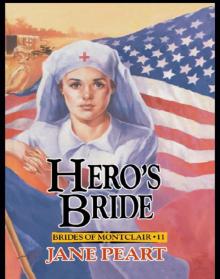 Hero's Bride
Hero's Bride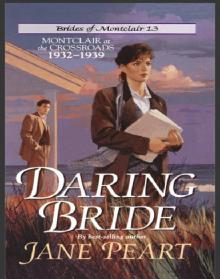 Daring Bride
Daring Bride Runaway Heart
Runaway Heart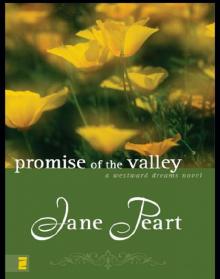 Promise of the Valley
Promise of the Valley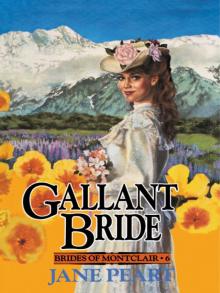 Gallant Bride
Gallant Bride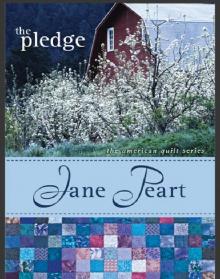 The Pledge, Value
The Pledge, Value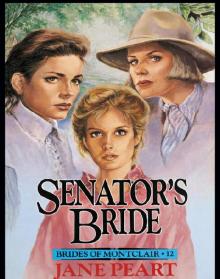 Senator's Bride
Senator's Bride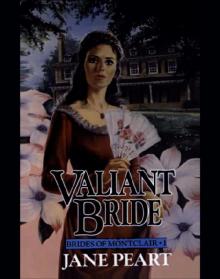 Valiant Bride
Valiant Bride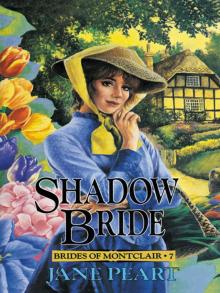 Shadow Bride
Shadow Bride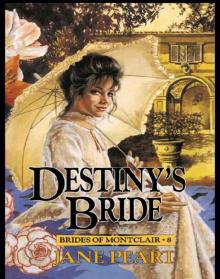 Destiny's Bride
Destiny's Bride A Tangled Web
A Tangled Web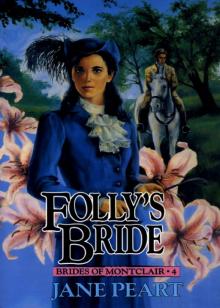 Folly's Bride
Folly's Bride The Promise
The Promise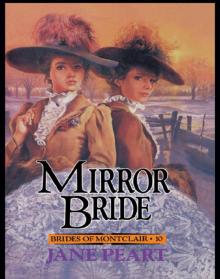 Mirror Bride
Mirror Bride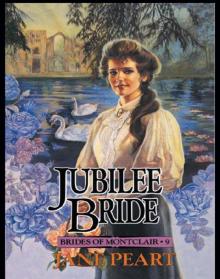 Jubilee Bride
Jubilee Bride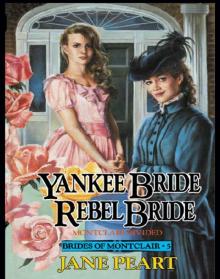 Yankee Bride / Rebel Bride
Yankee Bride / Rebel Bride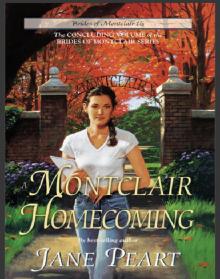 A Montclair Homecoming
A Montclair Homecoming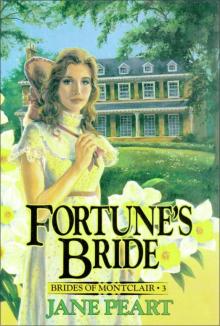 Fortune's Bride
Fortune's Bride Undaunted Spirit
Undaunted Spirit Love Takes Flight
Love Takes Flight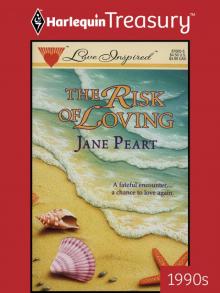 The Risk of Loving
The Risk of Loving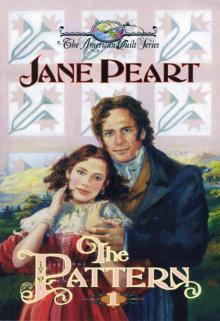 The Pattern
The Pattern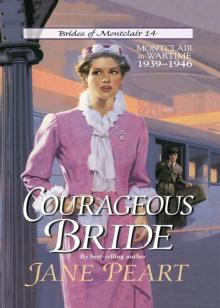 Courageous Bride
Courageous Bride